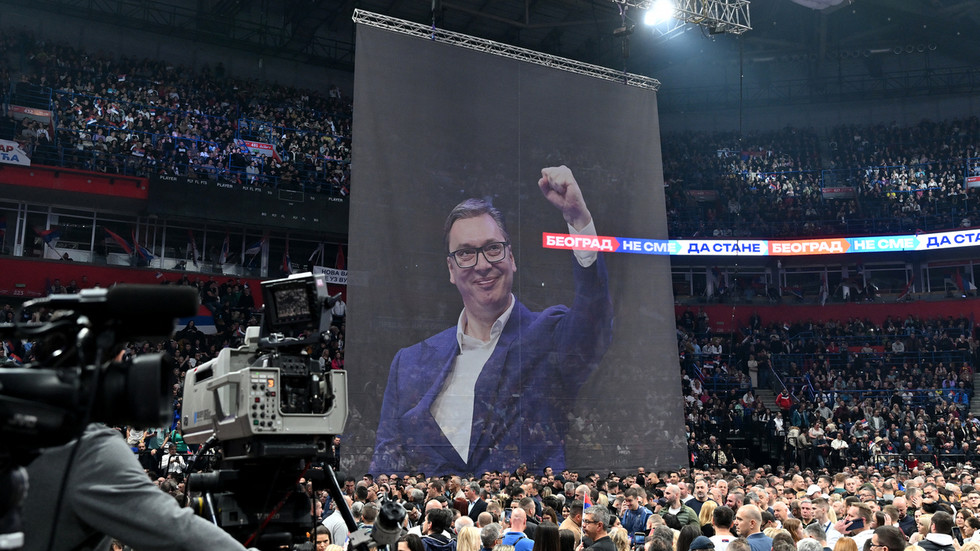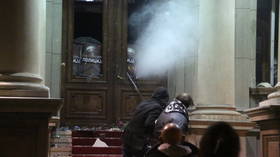
The ruling Progressives now have an absolute majority in parliament

File photo: A banner with a photo of President Aleksandar Vucic at the Serbian Progressive Party (SNS) election rally in Belgrade, December 2, 2023. © Andrej ISAKOVIC / AFP
The central election commission of Serbia announced the final and official results of the December 2023 parliamentary election on Wednesday, after a re-vote in eight precincts across the country. President Aleksandar Vucic’s Progressive party (SNS) will have a majority in the legislature.
Vucic called the snap election to “ensure a greater degree of democracy” after months of street protests by pro-Western activists, who used the May school shooting in Belgrade as a rallying cry for regime change.
Of the 3,820,746 citizens that voted, 1,783,701 or 46.7% cast their ballots for the ruling party. This gives them 130 seats in the 250-member Narodna Skupstina.
The main opposition coalition, calling itself ‘Serbia Against Violence’, received 902,450 votes, or 23.66% and 65 parliamentary seats. They alleged the election had been “rigged” by Vucic, claiming he had brought in 40,000 Serbs from Bosnia to vote in Belgrade. One of their candidates admitted the ‘video evidence’ for this was entirely staged by his activists, however.
‘Serbia Against Violence’ activists tried to break into the Belgrade city hall last weekend, but were dispersed by police. They complained about police brutality and appealed to the EU that the election should be declared illegitimate.

Read more
Serbia is not a member of the EU and has resisted pressure from Brussels to recognize the breakaway province of Kosovo and sanction Russia. That did not appear to factor very much into the electoral results.
Parties most vocally opposed to sanctioning Russia and recognizing Kosovo – Dveri and Zavetnici – lost all 20 seats in the parliament after winning only 2.76% of the votes. Meanwhile, the pro-Russian populist ‘Glas iz Naroda’ (People’s Voice) movement, which started as a YouTube channel, ended up getting 178,830 or 4.69% of the vote, for 13 parliamentary seats.
Overt champions of the EU and recognition of Kosovo fared even worse: former Democratic Party leader and ex-president Boris Tadic won just 1.18% of the vote, while a coalition calling itself ‘Serbia in the West’ received just 0.14%.
The Socialist Party, led by the current Foreign Minister Ivica Dacic, will have only 18 seats after receiving 6.55% or 249.916 votes. The monarchist-conservative NADA (NAtional Democratic Alternative) coalition will have 14 seats after winning 191,431 votes or 5.02%.
The ten remaining seats will go to ethnic minority parties, to which the 3% vote threshold does not apply.
The turnout in December was only 10,000 people more than in the April 2022 parliamentary election, despite a massive get-out-the-vote campaign by ProGlas, an initiative funded by Western embassies and NGOs.




